Part 1 - Results and
table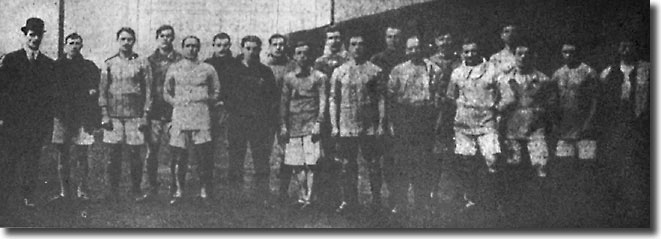
Leeds City began 1912 facing a very real threat of having to seek re-election
to the Football League. Though there were six teams below them in the
rankings, the Peacocks enjoyed only a meagre points advantage over them.
They had just six victories from their 21 games and the worst defensive
record in the division, having conceded 44 goals. The gloom was lifted
a little by a 3-1 victory against Nottingham Forest on 30 December, but
the future was not bright, especially considering the parlous state of
the club's financial affairs.
City kicked off the New Year with a daunting challenge, at Stamford Bridge,
home of championship-chasing Chelsea. Leeds were not fancied to gain even
a point, but they gave a good account of themselves and the Yorkshire
Post rated them as 'distinctly the better side for the greater part
of the first half'. It was only down to Billy McLeod's lack of sharpness
that they were not ahead at the break, but the 0-0 scoreline was encouraging.
The Londoners roused themselves after the resumption, though their opening
goal was fortunate. City skipper Tom Morris headed clear only for the
ball to strike Joe Moran and rebound into the Leeds net. Chelsea moved
into a three goal lead, before the Citizens fought back, netting twice
through McLeod and Mick Foley. That was as good as it got, and Chelsea
netted a fourth to emerge clear winners.
The following week brought the excitement of an FA Cup-tie against Glossop.
The visitors' party made their way to the ground in a fleet of cabs after
arriving in Leeds by train and centre-forward William Berwick twisted
an ankle disembarking on arrival at Elland Road. He had to be replaced
by Herbert, with the veteran amateur Herbert Stapley moving to centre.
Undeterred, Glossop took the game to City early on and the game was played
out in the Leeds half for the first fifteen minutes. In that time Scottish
international Tom Fitchie saw his shot strike the angle of post and crossbar.
City opened the scoring from their first real attack with twenty minutes
gone as Hugh Roberts headed home a cross from Fred Croot.
Tom Mulholland's fierce shot rattled the crossbar just before half time,
Croot later hit the post and Glossop's Stapley was denied by the bar after
virtually the last kick of the contest, but Roberts' goal was the only
one that counted and City had won a first round tie for the second time
in their brief history.
The Leeds public flocked to see the game, with 21,000 excited spectators
paying gate receipts of £570 for the privilege. Flaneur wrote in the Leeds
Mercury: 'It was shown on Saturday that the Leeds public need only
the smallest encouragement to rally round the club ... Is not this more
than sufficient proof that first class soccer would be supported splendidly
in Leeds?'
Centre-forward Billy McLeod had not played well and his form was at a
low ebb. The Mercury's Flaneur opined, 'There was one distinct
weakness in the Leeds City team. McLeod, who, on his day, is as classy
a player as the club possesses, was unaccountably off colour. He lacked
fire and determination, he was neither a leader of forwards nor a good
distributor of the ball, and he was very easily dispossessed.'
The centre-forward received support by way of a fan's letter printed
in the Yorkshire Evening Post. 'He is by far the best centre Leeds
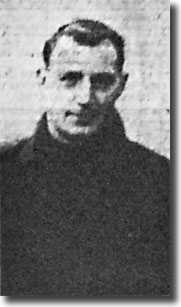 City
have had, and he has more brains and ability than any other individual
in the team ... The fault is with the half-backs, who cannot hold the
opposing forwards sufficiently to be able to give a centre-forward the
chance he reasonably expects. Again, the inside men are small, and cannot
rush any opposing backs. This makes it all the harder for the pivot of
the front line to get through. My advice to Leeds City spectators is to
give up laying the blame upon McLeod for missing opportunities which he
never gets, and to digest the fact that in the centre-forward they have
a class man.'
City
have had, and he has more brains and ability than any other individual
in the team ... The fault is with the half-backs, who cannot hold the
opposing forwards sufficiently to be able to give a centre-forward the
chance he reasonably expects. Again, the inside men are small, and cannot
rush any opposing backs. This makes it all the harder for the pivot of
the front line to get through. My advice to Leeds City spectators is to
give up laying the blame upon McLeod for missing opportunities which he
never gets, and to digest the fact that in the centre-forward they have
a class man.'
There was some truth in the letter, but McLeod was unquestionably out
of form and after playing in the home defeat against Clapton Orient, he
missed 6 of the next seven fixtures, declaring himself unfit with a groin
strain. In his absence, Mick Foley filled the void energetically, if none
too artistically. The Yorkshire Post described him as 'a somewhat unskilled
hustler' and reported after a win at Grimsby on 23 January: 'Foley, if
not showing special talent as a distributor of the ball, certainly exhibited
a pleasing disposition to shoot for goal whenever a chance presented itself.'
City were unlucky to lose to Clapton, for whom goalkeeper Hugall,who
would guest for Leeds during the First World War, gave a memorable display.
The Yorkshire Post: 'Probably the City have never had so much of
the play in any match and finished on the losing side." Flaneur wrote
in the Mercury of "a young man in a purple jersey, who seemed all arms,
and who could anticipate anything. No matter how the ball came to Hugall,
high or low, straight or from an acute angle, he stopped it and cleared,
and he wound up a wonderful afternoon's work by saving a penalty kick
from the foot of the usually certain Croot.'
The Peacocks thoroughly merited their 2-1 victory at Grimsby, but were
hammered 4-1 at Bristol City a week later, with three of the goals coming
in the first 20 minutes.
The setback was poor preparation for the FA Cup clash with First Division
West Bromwich Albion on 3 February. Another 20,000-plus crowd was on hand
to see the Peacocks substantiate the popular theory that they raised their
game against high class opposition.
The pitch was covered with a foot of snow in the days before the tie,
but a multitude of men were set to work on shovelling clear to ensure
that the money spinning contest went ahead. The move paid off and City
banked gate receipts of £666.
The game was played in a driving snowstorm, but there was no danger of
abandonment as two well-matched teams battled for supremacy. It was nip
and tuck throughout.
Albion played against the storm in the first half and had a golden opportunity
to take the lead in the opening minutes when a penalty was awarded against
George Affleck for handball. Goalkeeper Hubert Pearson was entrusted with
the spot kick, but he had to dash back smartly to his station when his
shot struck the post.
City could not capitalise on their reprieve. They were regularly on the
attack with Hugh Roberts in splendid form on the right wing, supplying
a string of promising centres, but none could be converted. Roberts was
guilty of a cardinal miss himself when he slammed a shot high over the
bar with only the keeper to beat.
City had the advantage after the break, though Albion enjoyed the clearer
opportunities. There were no goals and the game seemed to be drifting
towards a replay.
However, Albion scored a controversial winner in the closing seconds.
Leeds lost possession on the left and West Bromwich winger Claude Jephcott
beat Alec Creighton to send in a cross from the byline. 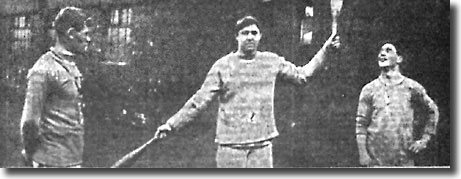 Centre-forward
Sid Bowser controlled the ball and forced it home from close range.
Centre-forward
Sid Bowser controlled the ball and forced it home from close range.
There was considerable dispute about the legitimacy of the goal, with
home crowd and players equally vocal in their protests. They argued on
a variety of grounds, claiming offside, accusing Bowser of hands as he
controlled Jephcott's centre, and asserting that Reinhardt had scooped
the ball round the post the ball before it crossed the goal line.
The referee, L F James of Birkenhead, consulted the linesman before awarding
the goal, to the frustration of City players and fans.
Flaneur in the Mercury: 'So open to question was the deciding
point that one can understand the disappointment of the home partisans.
Yet there was no justification for hooting Mr James and there was no sense
in the conduct of several hundred people who declined to leave the ground
until appealed to by Mr Scott-Walford. The game was handled very well,
indeed, and we must give the referee credit for an honest decision on
a point of which he was in a much better position to judge than were the
majority of those who hooted him as he left the field.
back to top
'There was more class to the work of the visitors, who placed the ball
with greater accuracy than their opponents, and showed just sufficient
superiority in method to suggest that they would have won nicely in normal
conditions of ground and weather. In the prevailing conditions they attempted,
in my judgement, rather too much close passing, whereas the Leeds City
men swung the ball well out and played with great dash and fire.
'But the home team lacked coolness in front of goal; they were deficient
in that extra bit of class that makes the difference between winning and
losing matches. Roberts in the first half and Enright in the second each
had a magnificent chance to score at close range, with the defence well
beaten, but each man shot wildly high above the bar. The chance that came
to Roberts was so excellent that he could have dribbled the ball in or
placed it just where he pleased had he been content to merely beat the
goalkeeper rather than anxious to burst the net.'
Two Mulholland goals brought a victory in the local derby at Huddersfield
on 10 February and Enright scored the only goal against Blackpool a week
later to lift City seven points clear of the re-election positions. The
Peacocks' position was improving, but all the teams below them had games
in hand and when City lost 2-1 at bottom club Glossop on 24 February,
the alarm bells started ringing.
City were one of three clubs on 21 points, and the four points above
them separated another six clubs. Glossop and Gainsborough looked dead
and buried with 15 and 14 points respectively, but the number of games
played was of greatest concern, with Leeds having played more than any
of their rivals.
City could only draw 0-0 at home to Hull City on 2 March and lost the
next three games on the bounce. The second of those saw the team plumbing
new depths with a 7-2 reverse at Fulham on 23 March. The 1-0 defeat at
home to Derby a week later saw City drop into the bottom two.
| |
Bottom of Division Two - 30 March 1912 |
| |
Pos
|
|
P
|
W
|
D
|
L
|
F
|
A
|
Pts
|
| |
13th
|
Birmingham
|
32
|
11
|
5
|
16
|
48
|
57
|
27
|
| |
14th
|
Blackpool |
31
|
10
|
7
|
14
|
28
|
42
|
27
|
| |
15th
|
Stockport
County |
31
|
9
|
8
|
14
|
36
|
42
|
26
|
| |
16th
|
Huddersfield
Town |
31
|
10
|
6
|
15
|
41
|
54
|
26
|
| |
17th
|
Bristol
City |
32
|
10
|
5
|
17
|
35
|
56
|
25
|
| |
18th
|
Glossop |
30
|
6
|
11
|
13
|
33
|
46
|
23
|
| |
19th
|
Leeds
City |
32
|
9
|
4
|
19
|
40
|
68
|
22
|
| |
20th
|
Gainsborough
T |
30
|
4
|
11
|
15
|
28
|
51
|
19
|
| |
|
|
|
|
|
|
|
|
|
On a positive note, Joe Moran and Joe Enright were called up by the Irish
selectors for the game with Scotland on 16 March. They cemented their
selection during a friendly against Linfield in Belfast at the start of
the month in a 2-2 draw. The directors were unanimous in their decision
to release the two players for the international. In their absence, City
lost 2-1 at home to Bradford Park Avenue in a bad tempered game that was
peppered by fouls and watched by two antagonistic sets of supporters.
The club's dismal financial situation mirrored the onfield chaos.
Secretary-manager Frank Scott-Walford
had to vehemently deny newspaper reports that City intended to sell gifted
Welsh winger Hugh Roberts. Nothing came of the rumours, but it was clear
that the directors desperately needed to raise funds to cover the club's
operating expenses.
Flaneur in the Mercury: 'Mr Scott-Walford has a great deal of
faith in the future of his young men, whom he regards as likely to develop
into a very fine side, and of whose general conduct he speaks in the warmest
terms ... The spade work that is being done at Elland Road cannot be of
any real value if so soon as a player begins to stand out above his fellows
he is lost to the club because the City cannot afford to refuse tempting
offers. The necessity of parting with promising players, and the inability
of the club to purchase good men, are discouraging features ... and it
may be some years yet ere the Leeds public have the luxury of First Division
football, for which they are already ripe.'
After the draw with Hull at the start of March, news broke that Scott-Walford
had reached the end of his tether. On 27 February he informed the board
of his intention to resign, writing as follows: 'I find it impossible
for me to conduct the affairs of the club any longer under present existing
circumstances. As you know, I have had to meet expenses, players' wages,
etc, times without number, also to advance transfer fees, signing on fees,
and summer wages during the past three years.
'The strain of these worries has caused a breakdown in my health, for,
as you all know, I have been ill for some considerable time. I should,
therefore, feel grateful if the directors will endeavour to relieve me
of the financial obligations that are due to me from the club on or before
March 31st, 1912.
'I feel it is a duty that I owe to my wife and family, and you will agree
it is not fair that a servant of the company should be continually called
upon to meet the club's liabilities. I must, therefore, kindly ask you
to make proper financial arrangements or relieve me of my duties as secretary
and general manager of the club on March 31st next.'
back to top
The last sentence hinted that the letter might have been a ploy to persuade
the board to repay him, but if that was the case it backfired. None of
the directors deigned to discuss the matter with Scott-Walford and the
next he knew was that the club had advertised in the Athletic News for
someone to replace him as team manager.
At a board meeting at the end of January, Scott-Walford had been instructed
to prepare the details of a financial reconstruction scheme. Following
his resignation, he became persona non grata at the club and was never
asked to submit his scheme.
At the beginning of April Scott-Walford was reported to have been appointed
as secretary of Nottingham Forest, but the deal fell through and he eventually
re-emerged as manager at Southern League Coventry City a year later.
By the end of March it was clear that Leeds City had reached crisis point,
with the bank's decision to call in the club's £8,000 overdraft the catalyst.
Chairman Norris Hepworth appointed
a Receiver to handle the club's affairs. Solicitor R Agar Chadwick issued
a letter on the 27th saying that the accountant
Tom Coombs, of King Street, Leeds, would henceforth manage the club's
financial affairs.
The Yorkshire Post reported as 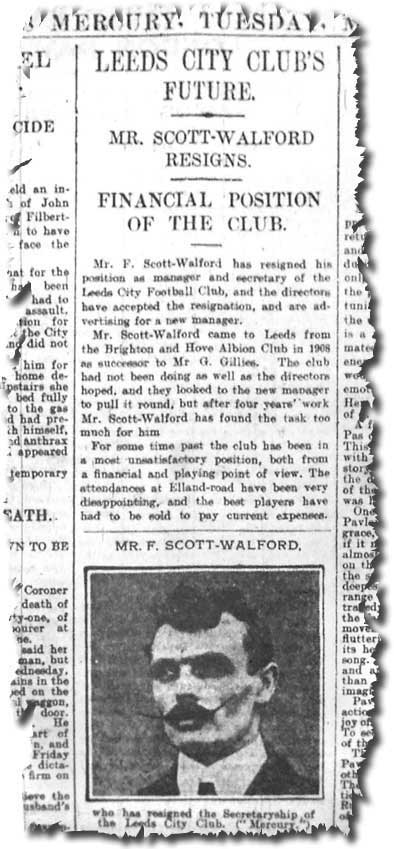 follows:
'At the commencement of the present football season it was stated that
the indebtedness of the club to Mr Norris Hepworth, the chairman, was
£10,733, and that the club's total indebtedness to all sources at that
date was £13,297. At a special general meeting of the shareholders, held
just after the season commenced, the directors submitted a scheme which
aimed at the liquidation of the whole of the club's indebtedness by an
appeal for fresh capital. New proposals were advanced by the shareholders,
however, and a small committee of shareholders was appointed to confer
with the directors on the matter, but apparently no substantial result
has been forthcoming from the movement. Mr Hepworth is still the principal
creditor of the club, and holds the bulk of the debentures.'
follows:
'At the commencement of the present football season it was stated that
the indebtedness of the club to Mr Norris Hepworth, the chairman, was
£10,733, and that the club's total indebtedness to all sources at that
date was £13,297. At a special general meeting of the shareholders, held
just after the season commenced, the directors submitted a scheme which
aimed at the liquidation of the whole of the club's indebtedness by an
appeal for fresh capital. New proposals were advanced by the shareholders,
however, and a small committee of shareholders was appointed to confer
with the directors on the matter, but apparently no substantial result
has been forthcoming from the movement. Mr Hepworth is still the principal
creditor of the club, and holds the bulk of the debentures.'
Alf Masser, who had been installed by the shareholders as a director
following the previous discussions, called a public meeting on the evening
of Thursday 11 April at the Grand Central Hotel in Leeds to consider the
reconstruction scheme. Masser chaired the meeting, saying that the large
number of attendees had confirmed 'that there was a great and genuine
demand for first class Association football in Leeds and that they were
not going to allow themselves to go under without a very great effort.'
(Hear, hear.) Masser revealed Norris Hepworth's asking price for the transfer
of his interest in the club.
The Leeds Mercury: 'Mr Hepworth had sunk in the club from £14,000
to £15,000. That amount would include the sum of money which would be
necessary to clear the club at the present moment from all debt. Mr Hepworth
had offered to him to transfer his interest if he found a gentleman with
£7,000. He had hoped to be able to tell them that night that he had found
such a gentleman. He had been in touch with two or three gentlemen, and
the most he could tell them was that they were all nibbling, but he had
not yet had a genuine bite.
'He could offer to any such purchaser a team of players who had been
valued at from £3,500 to £4,000. The stands and ground equipment had been
valued at £4,000, so that he was able to offer in bona fide cash value
£8,000 for the £7,000 he was asking. In addition, he wanted £3,000 from
the old shareholders and the public, and with that sum of money he was
certain the future welfare and success of the club was assured.'
The Elland Road ground was not actually owned by Hepworth, but he had
an option to purchase it and was willing to transfer that right to the
club. The purchase price had been set at £4,500 and it was proposed that
if the deal proceeded £3,500 would be left on mortgage until the club's
financial position had started to improve. It was promised that if the
£3,000 sought from shareholders was forthcoming, it would be made available
for the purchase of new players.
It was proposed that the company would be refloated with a total capital
of £10,000, the first £3,000 to be issued initially at a purchase price
of 5s each with the rest to follow as circumstances required.
Receiver Tom Coombs was present and moved that 'this meeting heartily
endorses the scheme of reconstruction put forward by Mr Masser, and pledges
itself by all means in its power to assist in raising the necessary funds
to place the club in a sound financial condition.' This motion was carried
unanimously and a number of committees, divided across the wards of Leeds,
were appointed to raise the required funds.
It was clear that the management of the club had improved little since
Masser had criticised it so strongly in 1910/11.
Nothing could have provided more tangible evidence than the appalling
scenes witnessed at Elland Road when the ground was chosen to host the
FA Cup replay between Bradford City and Barnsley on 18 March.
In March 1910, the Football Association had agreed to stage the Barnsley-Everton
Cup semi final at Elland Road and the event had been spoiled by inept
administration. Chaotic scenes resulted from overcrowding and thousands
more were locked outside.
City officials had claimed before that game that the stadium could comfortably
house 50,000 spectators. The gates were closed an hour before kick off
with less than 40,000 inside.
It was now accepted that the Elland Road enclosure could only accommodate
a crowd of 40,000. It seemed foolhardy therefore for City directors to
agree to the staging of a major derby which was bound to attract an enormous
crowd. As Yorkist noted in the Leeds Mercury: 'When the teams met
at Barnsley there was a crowd of about 25,000, and when they were at Bradford
close on 40,000 people saw the match. These figures were easily beaten
yesterday, and had the ground been big enough there is not the least doubt
that the attendance would have reached 70,000. Nobody could dream that
the opening of the gates two hours before the start was not early enough,
but within an hour the ground was packed and there were still thousands
of people clamouring for admission.'
When it became clear that demand for admission far exceeded the capacity,
ground officials again decided to lock the turnstiles, denying thousands
the opportunity to witness what was expected to be a thrilling encounter.
Frustrated by the move, a furious mob stormed the Elland Road end of the
ground and forced their way in. Tragedy could have resulted as those already
inside were forced forward by the rush, pouring over the rails and onto
the pitch. They swarmed across the playing area and assumed possession
of the main stand with its empty seats, awaiting the arrival of spectators
with reservations. The police were helpless in the face of the mass hysteria
and could not prevent the theft of a cash box containing more than £100.
Three thieves were detained and were convicted at Leeds Town Hall later
in the week.
Yorkist takes up the story: 'Hundreds of venturesome enthusiasts crowded
the housetops overlooking the ground, and others had the temerity to climb
onto the roof of the Leeds City secretary's office, and they refused to
be moved. The scene inside the enclosure itself was one which will never
be forgotten by all who witnessed it, and many will have wounds and bruises
to remind them of it.
'It seemed impossible that the crowd could be kept off the field of play,
though mounted officers were doing all in their power to press the people
back over the touchlines ... Naturally there were numerous cases of fainting
owing to the crush, and before the game started there was a pitiful procession
of fainting and injured unfortunates carried across the ground to be treated
by the ambulance men underneath the chief stand. This continued practically
all through the game, but it is pleasing to record that there was no serious
mishap to any of the spectators, all of them being afterwards able to
proceed home.
'For a long time it looked impossible for the game to be started. The
crowd had ruined the playing pitch, which had been on the soft side, and
soon became like a ploughed field. The touchlines and goal lines 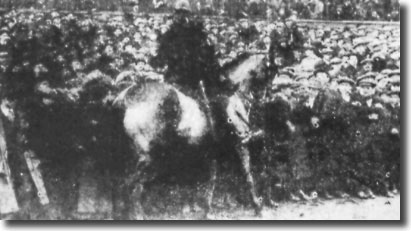 were
obliterated, and they had to be re-marked with whitewash before play could
begin. Thanks to the heroic efforts of the mounted officers the crowd
were pressed back, and the game was started a few minutes late. Time after
time, however, the crowd encroached over the lines and play had to be
stopped until they were forced back and the lines re-marked with whitewash
again.
were
obliterated, and they had to be re-marked with whitewash before play could
begin. Thanks to the heroic efforts of the mounted officers the crowd
were pressed back, and the game was started a few minutes late. Time after
time, however, the crowd encroached over the lines and play had to be
stopped until they were forced back and the lines re-marked with whitewash
again.
'At half-time the pent up crowd again broke loose and crowded over the
playing area, and it certainly now seemed hopeless to attempt any further
play, but the crowd was not bad natured, and they were forced back again,
and the game was restarted. The play had to be frequently stopped, however,
and eventually, five or ten minutes before time, the referee found it
was hopeless to proceed, and he sounded his whistle and motioned the players
to leave the field. Neither side had scored, and in the ordinary way,
an extra half hour should have been played, but no more play was attempted.
back to top
'The official return of the attendance was that 37,000 paid for admission,
the turnstile receipts being £1,800. This does not include the money from
the sale of tickets. It is estimated that about 30,000 people saw the
match, and that the receipts will eventually amount to over £2,000.'
The money was very useful, but Leeds City took little credit from the
day. Their reputation was badly damaged, and nothing could have made it
clearer that the directors cared less for the safety and comfort of spectators
than they did for filthy lucre. It was evident that nothing had been learned
from their previous debacle.
Away from the controversy, successive home draws against Birmingham (during
which George Affleck and Birmingham outside-right Hastings were dismissed)
and Stockport on Good Friday and Easter Saturday (5 and 6 April) kept
City in the bottom two and their visit to Cup finalists Barnsley on 11
April assumed must win status.
Billy McLeod scored two goals, his first since 6 January and Fred Croot
added two penalties to secure an exciting 4-3 victory, but the points
were insufficient to take City out of the re-election positions. They
were locked on 26 points with Glossop and when the Derbyshire team lost
2-1 at Clapton on 13 April to leave both clubs with 3 games to play, it
seemed certain that one of them would face re-election alongside doomed
Gainsborough.
City had a chance to steal a march on their rivals with a match at Stockport
on 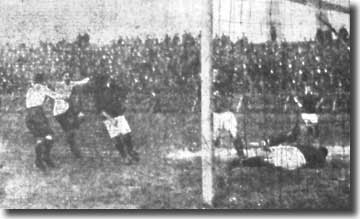 Monday
15 April. County themselves were not quite mathematically safe, though
it would have taken an extraordinary combination of results to drag them
into the mire.
Monday
15 April. County themselves were not quite mathematically safe, though
it would have taken an extraordinary combination of results to drag them
into the mire.
City took the lead after ten minutes when McLeod, under the shadow of
the bar, headed home a centre from Fred Croot as the County backs appealed
vainly for offside. Rodgers equalised for Stockport within two minutes,
but City were ahead again on the half hour when Mulholland scored from
close range. Stockport were level again by the break.
With ten minutes remaining, County keeper McIvor parried a Roberts shot
and McLeod headed City into the lead. That should really have been enough
to secure the points, but Stockport were in combative form. Five minutes
later they drew level for a third time when Smith equalised from a corner
and the match ended 3-3.
The draw took Leeds a point clear of Glossop, but when City dropped a
home point to Wolves on 20 April as Glossop hammered Bristol City 3-0,
the teams were tied again on 28 points. City's inferior goal average and
Glossop's game in hand gave the Derbyshire team a clear advantage.
It was no real comfort, but City had been unlucky to draw against Wolves.
The Midlanders had equalised from a rare attack and Mulholland was denied
by the bar three minutes from time.
Leeds now faced a crucial final game at Leicester with their very survival
as a league club resting on the outcome of the match.
City set their stall out from the start and they should have scored twice
within the first five minutes. But Fosse custodian Mearns was in splendid
form and proved equal to everything the Peacocks could throw at him. The
Leicester eleven had no sympathy for their opponents' plight and took
the lead midway through the first half.
City got a second wind after the break and were on continual attack.
However, Leicester broke away to grab a second goal. Enright managed to
pull one back with a fine drive and City poured forward in search of an
equaliser. It was all in vain as Leicester held out to secure a 2-1 victory.
Though Glossop lost 2-0 at Birmingham that same afternoon, their goal
average kept them clear of City. They had a game still to come, at Barnsley
two days later, but would have had to lose by ten goals for City to avoid
the re-election vote. They lost, but only by a single goal, and the 78
that City had conceded ensured it was they who had to rely on the votes
of their fellow clubs to preserve their Second Division status.
Alf Masser had indicated that 'he had received assurances from responsible
members of the Football League that wherever Leeds City were at the end
of the season, they would be re-elected,' but nothing was certain.
Indeed, before the end of April, City were forced to issue hasty and
strenuous denials of a number of recent announcements. There had been
claims that George Morrell of Woolwich Arsenal had been appointed to replace
Frank Scott-Walford as secretary and two local worthies, Ed Wood and Samuel
Samuel, had agreed to invest the £7,000 required to put the club on its
feet again. Further, according to the Yorkshire Evening Post, 'most
of the players of the 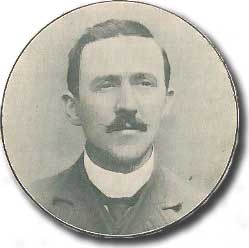 club
were up in arms because of an announcement which appeared in the morning
papers that only eight of their number were to be signed on for another
season.'
club
were up in arms because of an announcement which appeared in the morning
papers that only eight of their number were to be signed on for another
season.'
back to top
There had been 'intelligent anticipation' about the appointment of Morrell.
Hepworth confirmed that he had held discussions with him in London and
that 'It is a thousand to one that Mr Morrell will get the appointment.
But I have practically only settled with him this morning, so that no
one in Leeds had any authority for stating last night that Mr Morrell
had been appointed.'
It was also reported that the Receiver, Tom Coombs, had only just asked
the City directors to meet him to discuss players. He wrote to them as
follows, 'As you are aware it is imperative and necessary that the list
of players to be retained and those who are to be put on the transfer
list should be made up and completed this week. I shall therefore esteem
it a favour if you will be good enough to meet me at Elland Road on Friday,
the 26th inst, at two o'clock, for the purpose of giving me your advice
and counsel as to the players who ought to be signed on and those who
ought to be placed on the transfer list. This invitation has been sent
to the directors, Messrs Henry, Masser, Whiteman and Bromley and to Mr
Clifford Hepworth, as Mr N R Hepworth's representative.'
Coombs was angry about the release of misleading statements and claimed
that they did nothing but harm at a difficult time for the club. He told
the Evening Post, 'Association football in Leeds ought to be successful,
can be successful and will be successful. If only the public of Leeds
will stand by the club and have a little patience and confidence we shall
yet have a club at Elland Road capable of taking its place in the front
rank of Association football.'
It was confirmed that the required £7,000 had not yet been raised and
that while Alf Masser had held positive discussions with Wood and Samuel,
nothing had been agreed. Speculation could only lead to delays and should
be avoided at all costs.
The Evening Post profiled the supposed new City manager. 'Morrell
has been looked upon as almost a fixture at Woolwich, and during the four
and a half years in which he has been associated with the club he has
seen many exciting periods ... He had to take charge of the club when
it was in a bad financial position ... Messrs Norris and Hall of Fulham
came along with money and 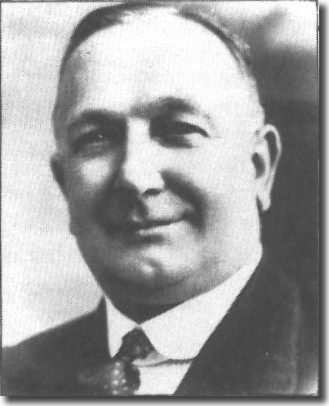 assistance,
and once this was done the way was paved for Mr Morrell to build up a
team. He went in mainly for young players, and was never keen on paying
large transfer fees. A native of Glasgow, he was, prior to taking up the
reins at Woolwich, manager for Greenock Morton, a famous Scottish club,
for three and a half years. His first experience in football management,
however, was as assistant to William Wilton, secretary of the Glasgow
Rangers.'
assistance,
and once this was done the way was paved for Mr Morrell to build up a
team. He went in mainly for young players, and was never keen on paying
large transfer fees. A native of Glasgow, he was, prior to taking up the
reins at Woolwich, manager for Greenock Morton, a famous Scottish club,
for three and a half years. His first experience in football management,
however, was as assistant to William Wilton, secretary of the Glasgow
Rangers.'
Within the week, it was announced that Morrell had turned down the City
post after originally indicating that he would accept. A number of friends
and acquaintances had persuaded him to remain at Arsenal.
It was a sad disappointment for City, but there was soon better news.
On Monday, 6 May, the Leeds Mercury reported that an appointment had finally
been made. 'The Leeds City club appear to have made a distinct capture
in their new football manager, Mr Herbert
Chapman.
'It was about a decade ago he first made the acquaintance of the Cobblers.
He left there to play for the Spurs in 1904, but came back as player manager
in 1907. The Cobblers were at the time in terrible straits. They were
the wooden spoonists of the Southern League, and only Mr A J Darnell's
persistent pleading saved them from relegation.
'Mr Chapman was the physician called in, and he succeeded in healing
their wounds. In his first year the Cobblers climbed into sixth position
in the Southern League ladder. The next year they actually won championship
honours. The balance sheet showed splendid gate receipts and members'
subscriptions totalled £1,855 in April 1907; in the return published for
1910/11 they aggregated £5,309, and when the complete return is issued
for the past season further progress will be seen. Both the ground and
the stand accommodation have been materially improved.
'Northampton folk will be sorry indeed to lose Mr Chapman, but there
is not one of them who will not wish him the best of luck.'
Chapman would certainly need 'the best of luck' at Leeds. He had but
a couple of weeks to ensure that the City club would be able to garner
sufficient votes to ensure that they remained members of the Football
League. On the evidence of the disastrous season they had just experienced,
retention of their status might only lead to further humiliation and Chapman
had much work to do.
Part 1 -












 City
have had, and he has more brains and ability than any other individual
in the team ... The fault is with the half-backs, who cannot hold the
opposing forwards sufficiently to be able to give a centre-forward the
chance he reasonably expects. Again, the inside men are small, and cannot
rush any opposing backs. This makes it all the harder for the pivot of
the front line to get through. My advice to Leeds City spectators is to
give up laying the blame upon McLeod for missing opportunities which he
never gets, and to digest the fact that in the centre-forward they have
a class man.'
City
have had, and he has more brains and ability than any other individual
in the team ... The fault is with the half-backs, who cannot hold the
opposing forwards sufficiently to be able to give a centre-forward the
chance he reasonably expects. Again, the inside men are small, and cannot
rush any opposing backs. This makes it all the harder for the pivot of
the front line to get through. My advice to Leeds City spectators is to
give up laying the blame upon McLeod for missing opportunities which he
never gets, and to digest the fact that in the centre-forward they have
a class man.' Centre-forward
Sid Bowser controlled the ball and forced it home from close range.
Centre-forward
Sid Bowser controlled the ball and forced it home from close range. follows:
'At the commencement of the present football season it was stated that
the indebtedness of the club to Mr Norris Hepworth, the chairman, was
£10,733, and that the club's total indebtedness to all sources at that
date was £13,297. At a special general meeting of the shareholders, held
just after the season commenced, the directors submitted a scheme which
aimed at the liquidation of the whole of the club's indebtedness by an
appeal for fresh capital. New proposals were advanced by the shareholders,
however, and a small committee of shareholders was appointed to confer
with the directors on the matter, but apparently no substantial result
has been forthcoming from the movement. Mr Hepworth is still the principal
creditor of the club, and holds the bulk of the debentures.'
follows:
'At the commencement of the present football season it was stated that
the indebtedness of the club to Mr Norris Hepworth, the chairman, was
£10,733, and that the club's total indebtedness to all sources at that
date was £13,297. At a special general meeting of the shareholders, held
just after the season commenced, the directors submitted a scheme which
aimed at the liquidation of the whole of the club's indebtedness by an
appeal for fresh capital. New proposals were advanced by the shareholders,
however, and a small committee of shareholders was appointed to confer
with the directors on the matter, but apparently no substantial result
has been forthcoming from the movement. Mr Hepworth is still the principal
creditor of the club, and holds the bulk of the debentures.' were
obliterated, and they had to be re-marked with whitewash before play could
begin. Thanks to the heroic efforts of the mounted officers the crowd
were pressed back, and the game was started a few minutes late. Time after
time, however, the crowd encroached over the lines and play had to be
stopped until they were forced back and the lines re-marked with whitewash
again.
were
obliterated, and they had to be re-marked with whitewash before play could
begin. Thanks to the heroic efforts of the mounted officers the crowd
were pressed back, and the game was started a few minutes late. Time after
time, however, the crowd encroached over the lines and play had to be
stopped until they were forced back and the lines re-marked with whitewash
again. Monday
15 April. County themselves were not quite mathematically safe, though
it would have taken an extraordinary combination of results to drag them
into the mire.
Monday
15 April. County themselves were not quite mathematically safe, though
it would have taken an extraordinary combination of results to drag them
into the mire. club
were up in arms because of an announcement which appeared in the morning
papers that only eight of their number were to be signed on for another
season.'
club
were up in arms because of an announcement which appeared in the morning
papers that only eight of their number were to be signed on for another
season.' assistance,
and once this was done the way was paved for Mr Morrell to build up a
team. He went in mainly for young players, and was never keen on paying
large transfer fees. A native of Glasgow, he was, prior to taking up the
reins at Woolwich, manager for Greenock Morton, a famous Scottish club,
for three and a half years. His first experience in football management,
however, was as assistant to William Wilton, secretary of the Glasgow
Rangers.'
assistance,
and once this was done the way was paved for Mr Morrell to build up a
team. He went in mainly for young players, and was never keen on paying
large transfer fees. A native of Glasgow, he was, prior to taking up the
reins at Woolwich, manager for Greenock Morton, a famous Scottish club,
for three and a half years. His first experience in football management,
however, was as assistant to William Wilton, secretary of the Glasgow
Rangers.'